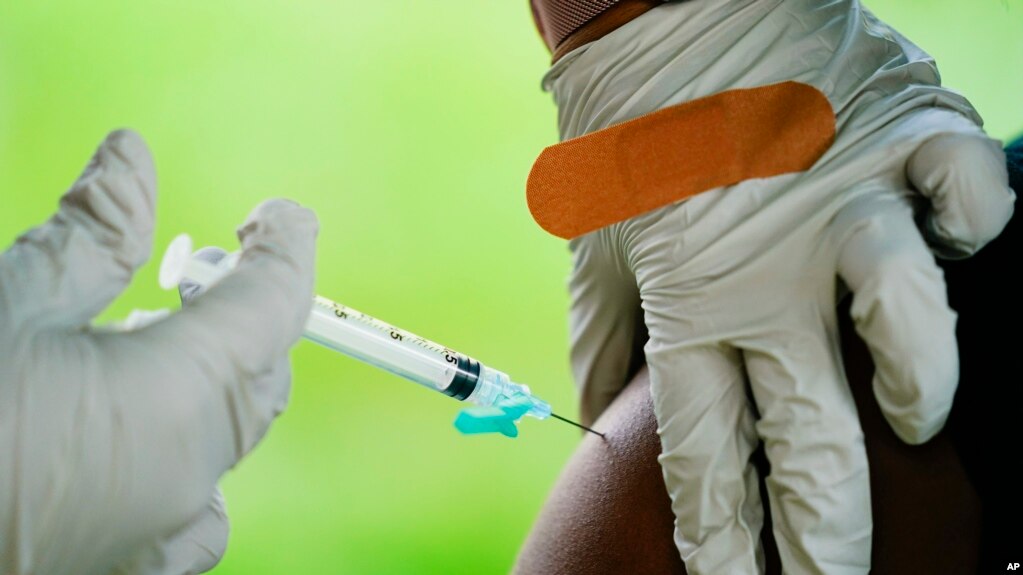
A health worker gives a dose of COVID-19 vaccine in Reading, Pa. COVID-19 vaccinations are at a critical juncture as companies test whether new approaches can keep up with a mutating coronavirus — even though it’s not clear if any change is needed. (AP Photo/Matt Rourke, File)
Drug companies are testing new methods to improve the efficacy of COVID-19 vaccines, using combination shots or nasal drops. They hope the continued research will help strengthen resistance to a continuously changing coronavirus.
Original vaccines and “bivalent” vaccines
The first COVID-19 vaccines remain protective against serious sickness, hospitalization and death, especially after a booster dose.
However, drug companies are facing growing pressure to develop vaccines better at fighting off milder infections.
Updating vaccines to match the latest variants is risky, because future variants could be very different. So, companies are considering something like a flu vaccine, which offers protection against three or four different strains in one shot every year.
Moderna and Pfizer are testing 2-in-1 COVID-19 protection that they hope to offer this fall. Each “bivalent” shot would mix the original, proven vaccine with an omicron-targeted version.
Moderna has some early evidence that the idea could work. It tested a combination shot that targeted the original version of the virus and an earlier variant named beta. It found vaccine recipients developed limited levels of antibodies capable of fighting not just beta but also newer variants like omicron. Moderna now is testing its omicron-targeted bivalent candidate.
Boosters
Dr. David Kimberlin, a CDC adviser from the University of Alabama at Birmingham, recently suggested that for the average person, two doses of the Pfizer or Moderna vaccine plus one booster — a total of three shots — “gets you set up” and ready for what may become a yearly booster.
After that first booster, CDC data suggests an additional dose offers most people a small, temporary benefit.
Experts recommend three shots because vaccination triggers development of antibodies that can fight off coronavirus infection. Such antibody levels naturally decrease over time.
But memory cells jump into action to make new virus-fighters if an infection sneaks in. Rockefeller University researchers found those memory cells may become stronger and able to target more diverse kinds of the virus after the third shot.
Even if someone who is vaccinated gets a mild infection, memory cells still help give “time to protect you against severe illness,” said Dr. Paul Offit of the Children’s Hospital of Philadelphia.
But some people — those with severely weakened immune systems — need more doses early on for a better chance of protection.
Americans 50 and older are being offered a second booster, following similar decisions by Israel and other countries that offer the extra shot to give older people a little more protection.
The CDC is developing advice to help those eligible decide whether to get an extra shot now or wait. Among those who might want a second booster sooner are the elderly, people with health problems or people who are at high risk of exposure from work or travel.
Nasal vaccines
It is hard for a shot in the arm to form lots of virus-fighting antibodies inside the nose where the coronavirus latches on. But a nasal vaccine might offer a new way to prevent infections.
“When I think about what would make me get a second booster, I actually would want to prevent infection,” said Dr. Grace Lee of Stanford University, who chairs CDC’s immunization advisory committee. “I think we need to do better.”
Nasal vaccines are difficult to develop, and it is not clear how quickly any could become available. But several are in clinical trials around the world. One in late-stage testing, made by India’s Bharat Biotech, uses a chimpanzee cold virus to deliver a harmless copy of the coronavirus spike protein to the lining of the nose.
“I certainly do not want to abandon the success we have had” with COVID-19 shots, said Dr. Michael Diamond of Washington University in St. Louis. Diamond helped create the candidate that is now licensed to Bharat.
But “we’re going to have a difficult time stopping transmission with the current … vaccines,” Diamond added. “We have all learned that.”
I’m John Russell.
Lauran Neergaard reported on this story for the Associated Press. John Russell adapted it for Learning English.
________________________________________________________________________
Words in This Story
nasal – adj. of or relating to the nose
variant – n. different in some way from others of the same kind
antibody – n. medical : a substance produced by the body to fight disease
benefit – n. a good or helpful result or effect
eligible – adj. able to do or receive something